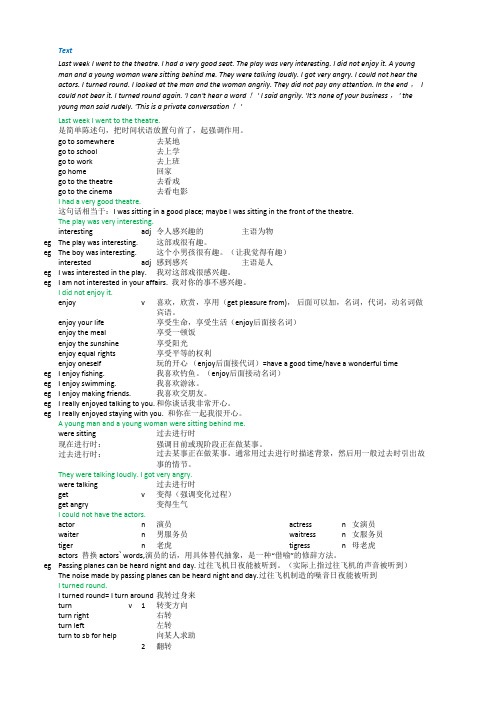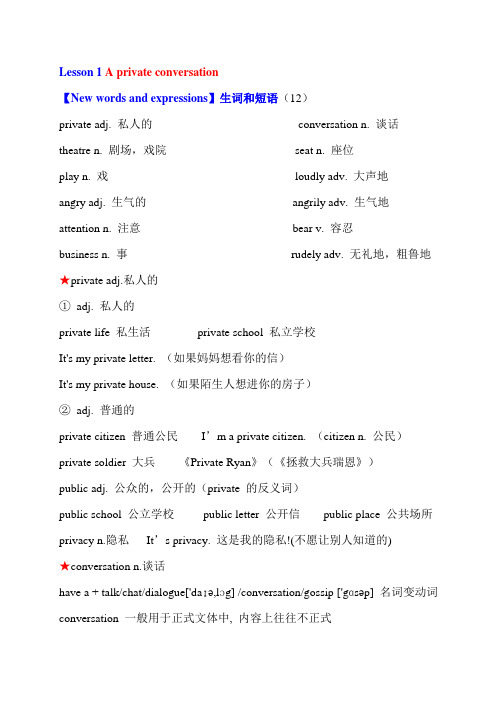裕兴新概念英语第二册第一课完美笔记
- 格式:doc
- 大小:51.50 KB
- 文档页数:13

TextLast week I went to the theatre.是简单陈述句,把时间状语放置句首了,起强调作用。
go to somewhere 去某地go to school 去上学go to work 去上班go home 回家go to the theatre 去看戏go to the cinema 去看电影I had a very good theatre.这句话相当于:I was sitting in a good place; maybe I was sitting in the front of the theatre.The play was very interesting.interesting adj 令人感兴趣的 主语为物eg The play was interesting.这部戏很有趣。
eg The boy was interesting.这个小男孩很有趣。
(让我觉得有趣)interested adj 感到感兴主语是人eg I was interested in the play.我对这部戏很感兴趣。
eg I am not interested in your affairs. 我对你的事不感兴趣。
I did not enjoy it.enjoy v enjoy your life 享受生命,享受生活(enjoy 后面接名词)enjoy the meal 享受一顿饭enjoy the sunshine 享受阳光enjoy equal rights 享受平等的权利enjoy oneself 玩的开心 (enjoy 后面接代词)=have a good time/have a wonderful time eg I enjoy fishing.我喜欢钓鱼。
(enjoy 后面接动名词)eg I enjoy swimming.我喜欢游泳。
eg I enjoy making friends.我喜欢交朋友。


单词学习jazz n.爵士音乐classical music 古典音乐folk music 民族音乐country music 乡村音乐pop (popular) music 流行音乐jazz 爵士音乐play jazz 演奏爵士乐eg.They tried to play jazz on the piano.他们试图在钢琴上演奏爵士音乐。
rock and roll 摇滚乐rap 拉普乐(说唱音乐)musical adj.音乐的music [U]a piece of music 一首音乐concert ['kɔnsət] [C] 音乐会musical adj.音乐的musician n.音乐家a music lesson 一堂音乐课a music teacher 音乐教师a music lover 音乐爱好者a piece of music 一首音乐face the music 面对失败;面对不愿面对而又不得不面对之事(说法: 1.新演员初上舞台非常紧张, 但是音乐响起了, 不得不上舞台, 必须去面对音乐, 面对自己不敢面对的事情;2.新兵入伍后参与军事检阅, 军乐响起来了, 不得不按照节拍去走, 哪怕再紧张也没有用。
)a musical instrument 一件乐器a misical performance 乐器演奏a musical score [skɔ:] 乐谱musical voice 美妙的声音instrument1) 器具, 仪器torture ['tɔ:tʃə] instruments 刑具operation instruments 手术器械2) 乐器musical instrument 乐器-----What kind of musical instrument can you play? 你会演奏哪种乐器呢?-----I can play the guitar.我会弹吉他。

新概念英语第二册 lesson 1 An exciting tripLesson 1 A private conversation课文内容:Last week I went to the theatre. I had a very good seat. The play was very interesting. I did not enjoy it. A young man and a young woman were sitting behind me. They were talking loudly. I got very angry. I could not hear the actors. I turned round. I looked at the man and the woman angrily. They did not pay any attention. In the end, I could not bear it.I turned round again. ‘I can't hear a word!’ I said angril y.‘It's none of your business, ’ the young man said rudely. ‘This is a private conversation!’Notes on the text 课文注释1 go to the theatre,去看戏。
2 got angry,生气。
3 turn round,转身,也可用turn around。
4 pay attention,注意。
5 I could not bear it.我无法忍受。
其中的it是指上文中的那对男女大声说话又不理会作者的愤怒目光。
6 none of your business,不关你的事。
参考译文:上星期我去看戏。
我的座位很好,戏很有意思,但我却无法欣赏。

Lesson 1 A private conversation【New words and expressions】生词和短语(12)private adj. 私人的conversation n. 谈话theatre n. 剧场,戏院seat n. 座位play n. 戏loudly adv. 大声地angry adj. 生气的angrily adv. 生气地attention n. 注意bear v. 容忍business n. 事rudely adv. 无礼地,粗鲁地★private adj.私人的①adj. 私人的private life 私生活private school 私立学校It's my private letter. (如果妈妈想看你的信)It's my private house. (如果陌生人想进你的房子)②adj. 普通的private citizen 普通公民I’m a private citizen. (citizen n. 公民)private soldier 大兵《Private Ryan》(《拯救大兵瑞恩》)public adj. 公众的,公开的(private 的反义词)public school 公立学校public letter 公开信public place 公共场所privacy n.隐私It’s privacy. 这是我的隐私!(不愿让别人知道的)★conversation n.谈话have a + talk/chat/dialogue['daɪə,lɔg] /conversation/gossip ['gɑsəp] 名词变动词conversation 一般用于正式文体中, 内容上往往不正式subject of conversation 话题They are having a conversation.talk 内容可正式可不正式, 也可以私人Let’s have a talk.dialogue 对话, 可以指正式国家与国家会谈。

单词学习catch (caught, caught) vt. 抓到catch fish 钓鱼,捕鱼catch a thief 抓住小偷catch the bus 赶公交车←→miss the bus 错过公交车catch one’s attention 吸引某人注意力/draw one’s attention/attract one’s attention/catch one’s eyes/draw one’s eyes/attract one’s eyescatch fire 着火(强调转变过程)be on fire 正在燃烧(强调状态)catch a cold 患感冒(强调转变过程)have a cold 正患感冒(强调状态)catch sb doing sth 抓住正在做某事旳人eg. The little boy was caught stealing apples from the garden.那个小男孩正在园子里偷苹果被抓住。
eg. The early bird catches the worm. 捷足先登。
grab 抓起,抢夺,热切或拼命地抓snatch 抢夺,忽然而迅速地抓起arrest (依法)逮捕capture 俘虏,捕获trap 设陷阱捕获grasp 紧握,抓住seize [si:z] 握紧,抓住catch it 被责骂,受惩罚(口)(一般与will等连用)eg. If I come home late, I’ll catch it from my mother. 如果我回家晚了,我妈妈会骂我。
catch up with 赶上eg. Go ahead, please. I’ll soon catch up wit h you. 你先走吧,我会不久赶上你旳。
catch on (意见,潮流)受欢迎旳catch phrase 标语,引人注意旳句子fisherman n. 钓鱼人,渔民fish →fisherman (pl. fishermen)fish n. 鱼[C]1) fish 鱼[pl.] 单复数同形2) fishes 不同种类旳鱼a big fish in a small pond. 山中无老虎猴子称霸王eg. When the cat is away, the mice will play. 老猫不在家老鼠笑呵呵。
Lesson 1 A private conversation 二、【New words and expressions】生词和短语(12)private adj. 私人的conversation n. 谈话theatre n. 剧场,戏院seat n. 座位play n. 戏loudly adv. 大声地angry adj. 生气的angrily adv. 生气地attention n. 注意bear v. 容忍business n. 事rudely adv. 无礼地,粗鲁地1、private (1)adj. 私人的同义词:personalprivate life 私生活private school 私立学校private letter 私人信件private conversation 私人谈话private company 私人公司private secretary 私人秘书private affairs 私事That is for your private ear. 那是说给你一个人听的秘密。
It's my private letter. (如果妈妈想看你的信)It's my private house. (如果陌生人想进你的房子)private 强调隐私personal 仅指个人的,不强调隐私,没有秘密可言(2)adj. 秘密的同义词:secreta private/secret place 一个秘密的地方(3)adj. 普通的private citizen 普通公民I'm a private citizen. (citizen n. 公民)private soldier 大兵《Private Ryan》(《拯救大兵瑞恩》)(4)public adj. 公众的,公开的(private 的反义词)public school 公立学校public letter 公开信public place 公共场所(5)privately adv. 私人、秘密=in privatepublicly adv. 公开=in public(6)privacy n.隐私It's privacy. 这是我的隐私!(不愿让别人知道的)2、conversation n.谈话talk内容可正式可不正式,也可以私人。
新概念英语第二册(Lesson1)学习笔记-全新概念英语第二册(Lesson 1)学习笔记Lesson 1 A private conversation 私人谈话【课文原文及翻译】First listen and then answer the question.听录音,然后回答以下问题。
Why did the writer complain to the people behind him?为什么作者抱怨他后面的人?Last week I went to the theatre.上星期我去看戏。
I had a very good seat.我的座位很好,The play was very interesting.戏很有意思,I did not enjoy it.但我却无法欣赏。
A young man and a young woman were sitting behind me. They were talking loudly.一青年男子与一青年女子坐在我的身后,大声地说着话。
I got very angry.我非常生气,I could not hear the actors.因为我听不见演员在说什么。
I turned round. I looked at the man and the woman angrily.我回过头去怒视着那一男一女,They did not pay any attention.他们却毫不理会。
In the end, I could not bear it.最后,我忍不住了,I turned round again.又一次回过头去,'I can't hear a word!' I said angrily.生气地说:“我一个字也听不见了!”'It's none of your business,' the young man said rudely.“不关你的事,”那男的毫不客气地说,'This is a private conversation!'“这是私人间的谈话!”【精讲笔记】★private adj.私人的如果妈妈想看你的信, 你可以说: It's my private letter.如果陌生人想进你的房子, 你可以说: It's my private house.private life 私生活由此引申出privacy n.隐私: private life 私生活It’s privacy.这是我的隐私!(不愿让别人知道的)新东方是private school(私立学校), 与此相反, 公立学校是public school.所以, private的反义词是public.eg.public 公众; public letter 公开信; public place 公共场所private还有一个值得注意的意思: 普通的.如: private citizen 普通公民:I’m a private citizen.private soldier 大兵;我们熟悉的《拯救大兵瑞恩》就是《Private Ryan》★conversation n.谈话subject of conversation : 话题(天气是英国人最喜爱的话题)【几种谈话】1、talk 内容可正式可不正式, 也可以私人: Let’s have a talk.2、conversation 一般用于正式文体中, 内容上往往不正式: They are having aconversation.3、dialogue 对话, 可以指正式国家与国家会谈:China and Korea are havinga dialogue.4、chat 闲聊, 就是北京人说的“侃”, 说的是无关紧要的事.5、gossip 嚼舌头, 说长道短have a + talk/chat/dialogue/conversation/gossip 名词变动词★seat n.座位这个词很重要, 考试常考.have a good seat,这里的seat指place(指地点不错), 而不是chair.take a seat/take your seat 坐下来, 就坐下面这个句子在口语、电影里很常见: Is the seat taken?(这个位置有人吗?) 考点: 作为动词的seat与sit的区别sit--vi; seat—vteg: He is sitting there.他住在那儿.You seat him.你给他找个位置.seat sb让某人就坐,后面会加人eg: seat yourselft.Seat him.★play n.戏★loudly adv. 大声的★angry adj. 生气的cross=angry ; I was angry./He was cross.annoyed: 恼火的;程I was annoyed.度I was angry/cross.加I was very angry.深be blue in the face : I am blue in the face.(脸色都青了, 相当生气了) △bear(bore,borne) v. 容忍bear,standI can't bear/stand youendure:忍受,容忍put up with :忍受I got divorced(离婚).I could not put up with himbear/stand/endure忍受的极限在加大put up with=bear=standbear n.熊white bearbear hug :热情(热烈)的拥抱give sb a bear hug△business n.事, 生意business man :生意人do business: 做生意go to some place on business:因公出差I went to Tianjin on business.thing 可以指事情,也可以指东西business:某人自己的私人的事情It's my business (指私人的事, 自己处理的事) it's none of your business。
新概念英语第二册笔记(顶级打印版)第一课 - A private soldier本课描述了一个士兵的日常生活。
他们生活在军营中,每天严格按照军队规章制度行事。
他们的一天由军号声和严格的时间表安排。
士兵们在清晨起床,进行体操训练,然后开始进行军事训练。
他们参加各种军事演,研究战斗技巧和战略。
他们的生活充满了纪律和奉献。
第二课 - Breakfast or lunch?本课主要描述了午餐时间和早餐时间的不同。
作者提到,大部分英国人喜欢在早上吃早餐,而午餐时间则相对短暂。
他们通常在中午吃快餐,并且对食物的要求较高。
然而,一些人喜欢在中午吃正式的午餐,他们会选择具有多道菜的套餐。
总的来说,英国人对早餐和午餐的重视程度不同,但他们都非常重视饮食的品质。
第三课 - Please send me a card第三课描述了寄送明信片的过程。
作者提到他收到了一封朋友寄来的明信片,于是他决定亲自到邮局去寄一封给朋友。
他描述了邮局内部的环境以及寄送明信片的步骤。
在邮局,他购买了一张明信片,写下了一些祝福的话语,并将明信片投入邮箱。
通过这个故事,我们可以了解到寄信的简单过程以及邮局的服务。
第四课 - An exciting trip本课描述了作者在乘坐飞机的旅行中的经历。
他搭乘飞机前往某个异国他乡。
他说他对飞行感到非常兴奋,飞机从地面升起,他逐渐能看到云朵和地球的景色。
作者感受到飞行的愉悦和独特之处。
尽管飞行中存在些许颠簸,但作者还是对这次旅行的刺激和兴奋充满期待。
第五课 - She's got a bike本课描述了一个女孩拥有自行车的故事。
女孩对自行车非常珍惜,并且乐于与别人分享。
她会骑着自行车到处游玩,与朋友一起度过美好的时光。
女孩非常喜欢自行车,她将它视为一种自由的方式。
做父母的则非常认同自行车的积极影响,并且对女孩骑行的能力感到骄傲。
第六课 - What's in your hand?本课描述了一个妇女在手中拿着一个刚刚购买的物品。
Lesson 1 A private conversation 二、【New words and expressions】生词和短语(12)private adj. 私人的conversation n. 谈话theatre n. 剧场,戏院seat n. 座位play n. 戏loudly adv. 大声地angry adj. 生气的angrily adv. 生气地attention n. 注意bear v. 容忍business n. 事rudely adv. 无礼地,粗鲁地1、private (1)adj. 私人的同义词:personalprivate life 私生活private school 私立学校private letter 私人信件private conversation 私人谈话private company 私人公司private secretary 私人秘书private affairs 私事That is for your private ear. 那是说给你一个人听的秘密。
It's my private letter. (如果妈妈想看你的信)It's my private house. (如果陌生人想进你的房子)private 强调隐私personal 仅指个人的,不强调隐私,没有秘密可言(2)adj. 秘密的同义词:secreta private/secret place 一个秘密的地方(3)adj. 普通的private citizen 普通公民I'm a private citizen. (citizen n. 公民)private soldier 大兵《Private Ryan》(《拯救大兵瑞恩》)(4)public adj. 公众的,公开的(private 的反义词)public school 公立学校public letter 公开信public place 公共场所(5)privately adv. 私人、秘密=in privatepublicly adv. 公开=in public(6)privacy n.隐私It's privacy. 这是我的隐私!(不愿让别人知道的)2、conversation n.谈话talk内容可正式可不正式,也可以私人。
裕兴新概念英语第二册第一课完美笔记 1 / 13 Let’s work hard together.I believe you’ll be proud of your beautiful English soon.Go for it.We can make it! 谚语 Where there is a will , there is a way. 有志者事竟成。
Get down to business. 言归正传 Lesson 1 A private conversation 私人谈话 New words and expressions private adj. 一般作定语修饰名词 ① 私人的(personal) a private conversation 私人谈话 a private company 私有公司 a private life 私生活 a private secretary 私人秘书 a private affairs 私事儿 eg. That is for your private ear. 这是说给你一个人的秘密。 ②秘密的(secret) a private place 一个秘密的地方 a secret place 一个秘密的地方 conversation n. 谈话 谈话:talk; say; speak; chat; discuss; gossip conversation n. 非正式谈话 (an informal talk) have a conversation with sb 跟某人谈话 eg. I had a quiet conversation with my closest friend. 我跟我最好的朋友进行了密谈。 eg. I saw him in conversation with a friend. 我看见他在和一个朋友谈话。 eg. No conversation while I'm talking. 我讲话的时候不要谈话。 相关短语: 1)converse vi. converse with sb 跟某人谈话 2)talk n./ vi. talk with/to sb 和某人谈话 talk with/to sb about sth 跟某人谈论什么事情 3)say vt. say sth 说了一些话 eg.He said nothing. 他什么也没说。 eg. "What a lovely day," he said. 4)speak vt. 讲(语言) speak a foreign language 讲一门外语 裕兴新概念英语第二册第一课完美笔记 2 / 13 speak Chinese 讲中文 speak English 讲英语 speak vi. 谈话 speak to sb 和某人谈话 speech n. 讲话谈话 make a speech 做演讲 5)chat n./v. 聊天 (talk friendly 友好地谈话) eg. We had a long chat about old times. 我们聊了很多关于过去的事。 6)discuss v. 有着严肃目的的讨论 discussion n. 讨论 7)gossip v./n. refers to talk about private lives of other people(贬义)说闲话,嚼舌头 eg. He is nothing but a gossip. 他就是个爱嚼舌头的人。 theatre n. (in US: theater) metre—meter (in US) centre—center (in US) go to the theatre 去看戏,去剧院 go to the movies/cinema/film 去看电影,movie (in US):电影 theatre=(口)play house theatre goer 戏迷 go+er=goer 去的人。 也可以表达为:play goer 戏迷 seat (本课重点词) 区别: seat n./vt. [si:t] 长音 sit vi. [sit]短音 chair 椅子,可以搬动的 seat n. 座位,固定在某地的 eg. We don't have enough chairs here. 我们没有足够的椅子。 eg. Is this seat taken? 这个座位有人坐吗? ①n. 座位,座 eg. Have a seat, please. / Take a seat, please. 请坐。 eg. I had a very good seat. 我的座位非常好。 相当于Maybe I sat in the front of the theatre. 也许是我坐在戏院的前面,所以说座位很好。 seatbelt=safety belt 安全带 in the driver's seat = in the leader's seat/place 在领导的位置上,指某人非常重要的意思。 裕兴新概念英语第二册第一课完美笔记 3 / 13 back-seat driver 后座司机,指的是爱指手画脚的人。 ②n. 席位 win/lose a seat 赢得/输掉一个席位 ③vt. 安排……坐下 seat sb 安排某人坐下 seat yourself 你请坐 eg. Be seated, please. 请坐。 表示请坐的方式: eg. Sit down, please. Will you have a seat? Won't you have a seat? Would you have a seat? Be seated , please. Seat yourself, please. play ①n. 玩耍,游戏,娱乐 playboy 花花公子 playground 操场 ②v. 玩,玩耍 play with sb 跟某人玩;玩弄某人(慎重使用这个短语) play with sth 玩弄,摆弄什么东西 play with a ball 玩弄,摆弄一个球 play with a toy 玩弄,摆弄一个玩具 play gooseberry (酷栗)摆弄醋栗,表示当电灯泡,尤其是在情侣之间当电灯泡,也就是妨碍别人谈恋爱的意思。这个短语源自西方习俗。从前有些西方人有钱人家的女孩子都由老妈子伺候着,等到她们长大成人的时候,谈恋爱的时候,或在社交场合也有年长的女伴陪着,据说少女很难有见面的时候,有时候这个在一旁的陪伴的妇女为了便于监视,又不太露骨,便端一盘醋栗在旁包起来。从此,play gooseberry(摆弄醋栗)便表示监视别人谈恋爱的意思,类似中文所说的在情侣之间当电灯泡的意思。 ③v. 玩,比赛 play football 踢足球 play basketball 打篮球 play volleyball 打台球 play cards 打扑克 play chess 下棋 注意:在运动项目的前面不加定冠词"the" 裕兴新概念英语第二册第一课完美笔记 4 / 13 play the piano 弹钢琴 play the violin 拉小提琴 play the guitar 弹吉他 注意:在乐器的前面加"the" ④n. 戏剧,剧本 theatre play 戏剧,剧院上映的那些 TV play 电视剧 soap play 电视连续剧,因为这样的电视连续在最初是由肥皂公司来赞助,在播放的间隙,穿插的都是肥皂、清洁剂等商品的广告。 play goer 戏迷 eg. It is as good as a play. (像戏一样的好)好玩极了。 eg. You must come here, or, there is no play. 你必须来这儿,否则,就没戏了。 no play 没戏 区别: play 戏剧,剧本 drama 戏,戏剧文学,戏剧艺术 opera 歌剧 Beijing Opera 京剧 loud adj. 大声的 loudly adv.大声地 aloud adv. 大声地 eg. She called loudly for help.=She called aloud for help. 她大声呼救。 think aloud 自言自语 adj. + ly → adv. angry adj. → angrily adv. rude adj.→ rudely adv. eg. The young man said rudely. 这个年轻人粗鲁的说。 real adj. → really adv. exact adj. → exactly adv. quick adj. → quickly adv. quiet adj. → quietly adv. attention n. 注意 pay attention to sth 对……给予注意 pay some attention to sth 给予一定的注意 pay more attention to sth 给予更多的注意 pay close attention to sth 给予密切的注意